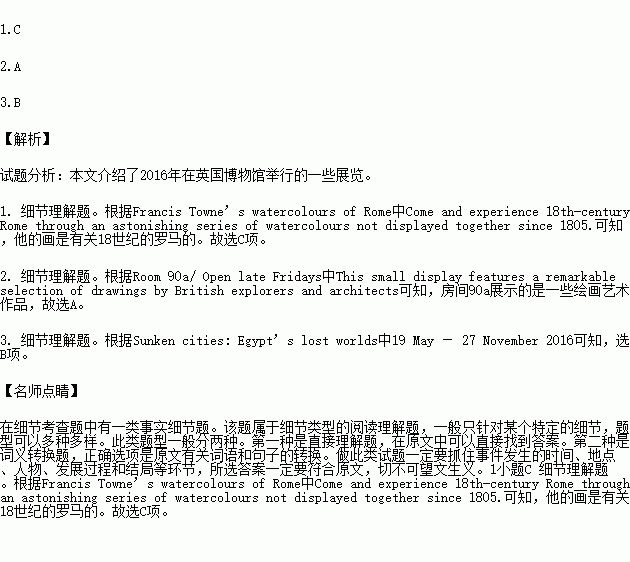题目内容
2016 Exhibitions in the British Museum
Sunken cities: Egypt’s lost worlds
19 May - 27 November 2016
Sainsbury Exhibitions Gallery
Adults£16.50, Members/under 16s free
Sunken under the sea for over a thousand years, two lost cities of ancient Egypt were lately rediscovered. Their amazing discovery is transforming our understanding of the deep connections between the great ancient civilizations of Egypt and Greece. Their story is told for the first time in this exhibition.
Francis Towne’s watercolours of Rome
21 January - 14 August 2016
Room 90/ Open late Fridays
Free, just drop in
Come and experience 18th-century Rome through an astonishing series of watercolours not displayed together since 1805.
Sicily: culture and conquest
21 April - 14 September 2016
Room 35
Tickets: Adults£10, Members/under 16s free
This exhibition tells Sicily’s fascinating stories - from the arrival of the Greeks and other settlers, to the extraordinary period of enlightenment(启蒙) under Norman rule in the 11th to 13th centuries.
Early British exploration of the classical world
14 March - 27 July 2016
Room 90a/ Open late Fridays
Free, just drop in
This small display features a remarkable selection of drawings by British explorers and architects, who discovered and documented some of Sicily’s best surviving classical sculpture and architecture.
1.Which place does Francis Towne’s works picture?
A. Egypt.B. France.C. Rome.D. Sicily.
2.What art works are housed in Room 90a?
A. Drawings.B. Buildings.C. Sculptures.D. Watercolours.
3.Which exhibition can you attend in October?
A. Sicily: culture and conquest
B. Sunken cities: Egypt’s lost worlds
C. Francis Towne’s watercolours of Rome
D. Early British exploration of the classical world

